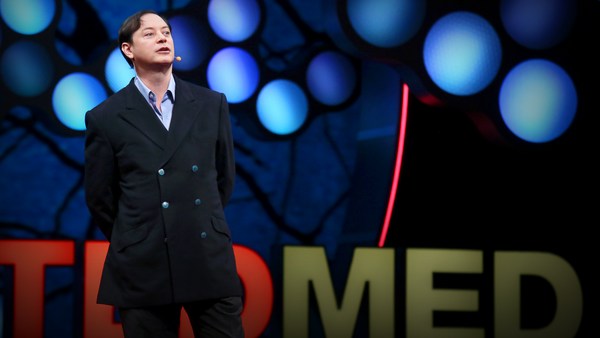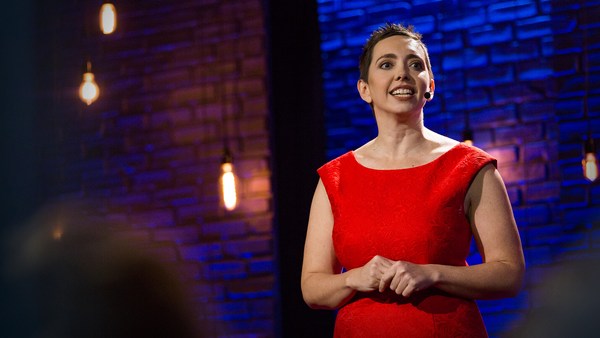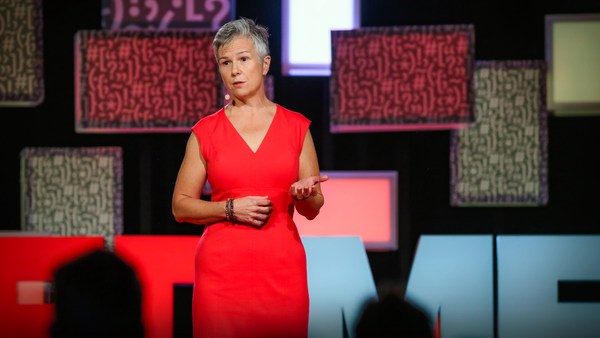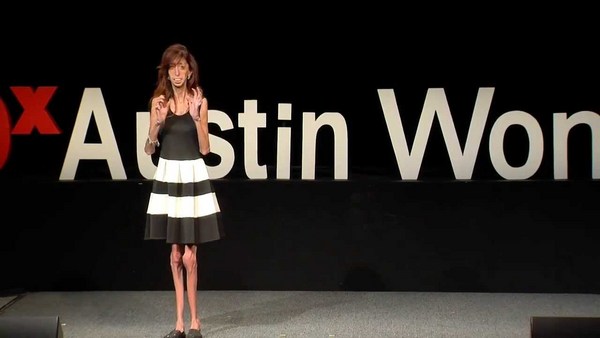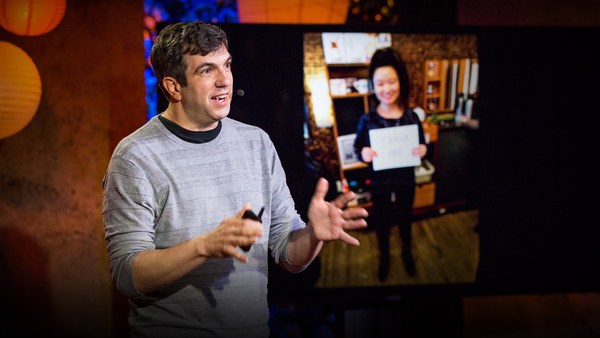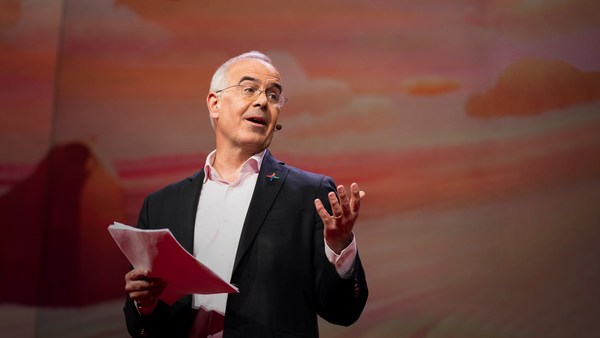There's an ancient parable about a farmer who lost his horse. And neighbors came over to say, "Oh, that's too bad." And the farmer said, "Good or bad, hard to say." Days later, the horse returns and brings with it seven wild horses. And neighbors come over to say, "Oh, that's so good!" And the farmer just shrugs and says, "Good or bad, hard to say." The next day, the farmer's son rides one of the wild horses, is thrown off and breaks his leg. And the neighbors say, "Oh, that's terrible luck." And the farmer says, "Good or bad, hard to say." Eventually, officers come knocking on people's doors, looking for men to draft for an army, and they see the farmer's son and his leg and they pass him by. And neighbors say, "Ooh, that's great luck!" And the farmer says, "Good or bad, hard to say."
I first heard this story 20 years ago, and I have since applied it 100 times. Didn't get the job I wanted: good or bad, hard to say. Got the job I wanted: good or bad, hard to say. To me, the story is not about looking on the bright side or waiting to see how things turn out. It's about how eager we can be to label a situation, to put concrete around it by judging it. But reality is much more fluid, and good and bad are often incomplete stories that we tell ourselves. The parable has been my warning that by gripping tightly to the story of good or bad, I close down my ability to truly see a situation. I learn more when I proceed and loosen my grip and proceed openly with curiosity and wonder.
But seven years ago, when I was pregnant with my first child, I completely forgot this lesson. I believed I knew wholeheartedly what was good. When it came to having kids, I thought that good was some version of a superbaby, some ultrahealthy human who possessed not a single flaw and would practically wear a cape flying into her superhero future. I took DHA pills to ensure that my baby had a super-high-functioning, supersmart brain, and I ate mostly organic food, and I trained for a medication-free labor, and I did many other things because I thought these things would help me make not just a good baby, but the best baby possible.
When my daughter Fiona was born, she weighed 4 pounds, 12 ounces, or 2.15 kilograms. The pediatrician said there were only two possible explanations for her tiny size. "Either," he said, "it's bad seed," "or it's bad soil." And I wasn't so tired from labor to lose the thread of his logic: my newborn, according to the doctor, was a bad plant. Eventually, I learned that my daughter had an ultra-rare chromosomal condition called Wolf-Hirschhorn syndrome. She was missing a chunk of her fourth chromosome. And although my daughter was good -- she was alive, and she had brand new baby skin and the most aware onyx eyes -- I also learned that people with her syndrome have significant developmental delays and disabilities. Some never learn to walk or talk.
I did not have the equanimity of the farmer. The situation looked unequivocally bad to me. But here's where the parable is so useful, because for weeks after her diagnosis, I felt gripped by despair, locked in the story that all of this was tragic. Reality, though -- thankfully -- is much more fluid, and it has much more to teach. As I started to get to know this mysterious person who was my kid, my fixed, tight story of tragedy loosened. It turned out my girl loved reggae, and she would smirk when my husband would bounce her tiny body up and down to the rhythm. Her onyx eyes eventually turned the most stunning Lake Tahoe blue, and she loved using them to gaze intently into other people's eyes. At five months old, she could not hold her head up like other babies, but she could hold this deep, intent eye contact. One friend said, "She's the most aware baby I've ever seen."
But where I saw the gift of her calm, attentive presence, an occupational therapist who came over to our house to work with Fiona saw a child who was neurologically dull. This therapist was especially disappointed that Fiona wasn't rolling over yet, and so she told me we needed to wake her neurology up. One day she leaned over my daughter's body, took her tiny shoulders, jostled her and said, "Wake up! Wake up!" We had a few therapists visit our house that first year, and they usually focused on what they thought was bad about my kid. I was really happy when Fiona started using her right hand to bully a dangling stuffed sheep, but the therapist was fixated on my child's left hand. Fiona had a tendency not to use this hand very often, and she would cross the fingers on that hand. So the therapist said we should devise a splint, which would rob my kid of the ability to actually use those fingers, but it would at least force them into some position that looked normal.
In that first year, I was starting to realize a few things. One: ancient parables aside, my kid had some bad therapists.
(Laughter)
Two: I had a choice. Like a person offered to swallow a red pill or a blue pill, I could choose to see my daughter's differences as bad; I could strive toward the goal that her therapists called, "You'd never know." They loved to pat themselves on the back when they could say about a kid, "You'd never know he was 'delayed' or 'autistic' or 'different.'" I could believe that the good path was the path that erased as many differences as possible. Of course, this would have been a disastrous pursuit, because at the cellular level, my daughter had rare blueprints. She wasn't designed to be like other people. She would lead a rare life. So, I had another choice: I could drop my story that neurological differences and developmental delays and disabilities were bad, which means I could also drop my story that a more able-bodied life was better. I could release my cultural biases about what made a life good or bad and simply watch my daughter's life as it unfolded with openness and curiosity.
One afternoon she was lying on her back, and she arched her back on the carpet stuck her tongue out of the side of her mouth and managed to torque her body onto her belly. Then she tipped over and rolled back onto her back, and once there, she managed to do it all over again, rolling and wiggling her 12-pound self under a coffee table. At first, I thought she'd gotten stuck there, but then I saw her reaching for something that her eye had been on all along: a black electric cord. She was a year old. Other babies her age were for sure pulling up to stand and toddling around, some of them. To some, my kid's situation looked bad: a one-year-old who could only roll. But screw that. My kid was enjoying the new, limber freedom of mobility. I rejoiced. Then again, what I watched that afternoon was a baby yanking on an electric cord, so you know, good or bad, hard to say.
(Laughter)
I started seeing that when I released my grip about what made a life good or bad, I could watch my daughter's life unfold and see what it was. It was beautiful, it was complicated, joyful, hard -- in other words: just another expression of the human experience.
Eventually, my family and I moved to a new state in America, and we got lucky with a brand-new batch of therapists. They didn't focus on all that was wrong with my kid. They didn't see her differences as problems to fix. They acknowledged her limitations, but they also saw her strengths, and they celebrated her for who she was. Their goal wasn't to make Fiona as normal as possible; their goal was simply to help her be as independent as possible so that she could fulfill her potential, however that looked for her.
But the culture at large does not take this open attitude about disabilities. We call congenital differences "birth defects," as though human beings were objects on a factory line. We might offer pitying expressions when we learn that a colleague had a baby with Down syndrome. We hail a blockbuster film about a suicidal wheelchair user, despite the fact that actual wheelchair users tell us that stereotype is unfair and damaging. And sometimes our medical institutions decide what lives are not worth living. Such is the case with Amelia Rivera, a girl with my daughter's same syndrome. In 2012, a famous American children's hospital initially denied Amelia the right to a lifesaving kidney transplant because, according to their form, as it said, she was "mentally retarded." This is the way that the story of disabilities as bad manifests in a culture.
But there's a surprisingly insidious counterstory -- the story, especially, that people with intellectual disabilities are good because they are here to teach us something magical, or they are inherently angelic and always sweet. You have heard this ableist trope before: the boy with Down syndrome who's one of God's special children, or the girl with the walker and the communication device who is a precious little angel. This story rears its head in my daughter's life around Christmastime, when certain people get positively giddy at the thought of seeing her in angel's wings and a halo at the pageant. The insinuation is that these people don't experience the sticky complexities of being human. And although at times, especially as a baby, my daughter has, in fact, looked angelic, she has grown into the type of kid who does the rascally things that any other kid does, such as when she, at age four, shoved her two-year-old sister. My girl deserves the right to annoy the hell out of you, like any other kid.
When we label a person tragic or angelic, bad or good, we rob them of their humanity, along with not only the messiness and complexity that that title brings, but the rights and dignities as well. My girl does not exist to teach me things or any of us things, but she has indeed taught me: number one, how many mozzarella cheese sticks a 22-pound human being can consume in one day -- which is five, for the record; and two, the gift of questioning my culture's beliefs about what makes a life good and what makes life bad.
If you had told me six years ago that my daughter would sometimes use and iPad app to communicate, I might have thought that was sad. But now I recall the first day I handed Fiona her iPad, loaded with a thousand words, each represented by a tiny little icon or little square on her iPad app. And I recall how bold and hopeful it felt, even as some of her therapists said that my expectations were way too high, that she would never be able to hit those tiny targets. And I recall watching in awe as she gradually learned to flex her little thumb and hit the buttons to say words she loved, like "reggae" and "cheese" and a hundred other words she loved that her mouth couldn't yet say. And then we had to teach her less-fun words, prepositions -- words like "of" and "on" and "in." And we worked on this for a few weeks. And then I recall sitting at a dining room table with many relatives, and, apropos of absolutely nothing, Fiona used her iPad app to say, "poop in toilet."
(Laughter)
Good or bad, hard to say.
(Laughter)
My kid is human, that's all. And that is a lot.
Thank you.
(Applause)
